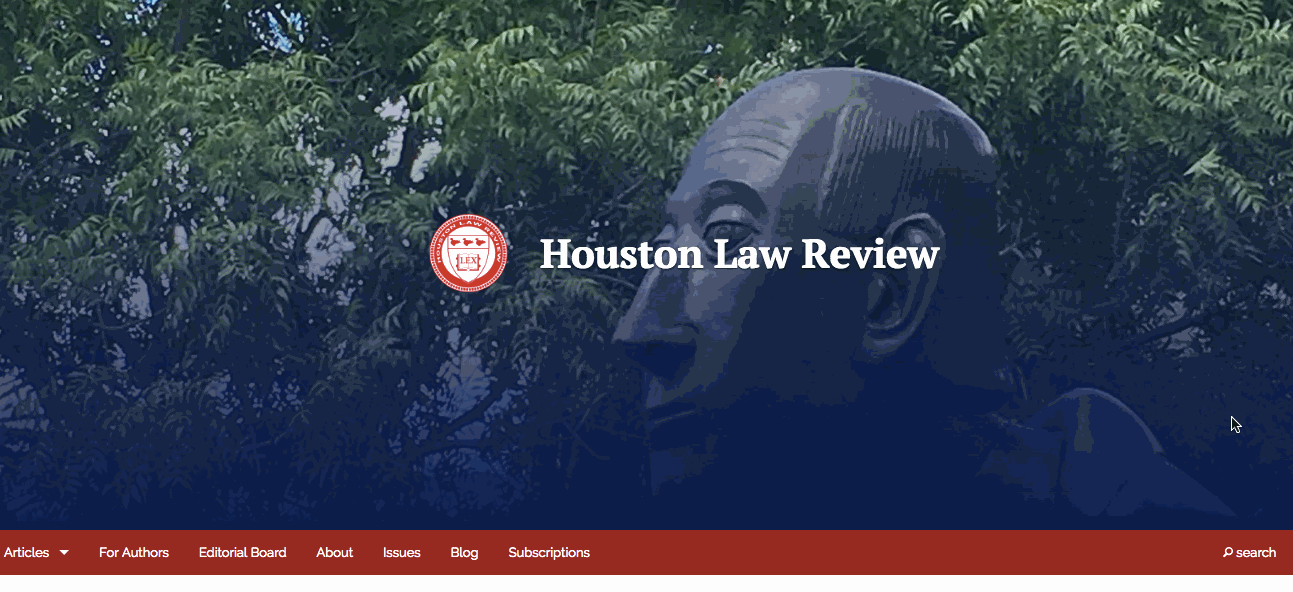
Since its founding in 1963, the Houston Law Review has been driven by ambitious student editors committed to cultivating their university’s reputation as a modern law center and providing a platform for legal scholarship on far-reaching topics. The current e-board is no exception—not only continuing the law review’s legacy of publishing quality content but also looking to the journal’s digital future and taking steps to better serve their many online readers.
In time for its 56th volume, the Houston Law Review has launched a new website using Scholastica’s publishing platform, and started publishing both PDF and HTML articles using Scholastica’s production service. The team was driven by the desire to make their content more discoverable online and empower readers to explore the law review from all digital devices. The new law review website and article formats are helping the Houston Law Review to not only present articles in more engaging ways but also optimize its content for mainstream and academic search engines, with rich machine-readable metadata, full-text XML files for all articles, and Google Scholar links in references among other search and indexing benefits.

In the below interview, Henry Legg Editor in Chief for Board 56 discusses why Houston Law Review decided to revamp their online presence and how Scholastica’s publishing software and production service are helping them to better meet the needs of digital readers.
Q&A with Henry Legg
Where is the Houston Law Review today in terms of fulfilling your mission and vision for the publication and what made you decide to focus on revamping your online presence?
HL: Our general mission, of course, is to publish a well-recognized and high-quality scholarly legal journal. I’m proud of the hard work our editorial board has demonstrated over this past year and believe that this year’s volume continues our tradition of being a strong publication. Our incoming editorial board was just elected, and I’m confident that they are going to do an even better job over their tenure.
Yet, to continue to reach new heights, we recognized that we also needed to modernize our public face and the public’s ability to find and access the work of authors who have published or will publish with us. Thus, we decided to update our website, with the goal of making our content even easier to find and access.
What are your top priorities for the Houston Law Review in terms of improving your online presence? And what made you decide to use Scholastica’s publishing tools and production service?
HL: First, our most important asset is our published content. So it’s important that our website helps visitors find the article that they were looking for or an article that will be helpful for them.
Hosting our website with Scholastica increases the chances that the contents of our articles is easily accessible to researchers and the public. We just adopted Scholastica’s HTML typesetting service, and I think this makes our articles look and read much better compared to just posting a copy of the article PDF that is published in print. I also hope that adopting typesetting will assist readers in finding our content more easily moving forward as typesetting should make the content of our articles more search-engine friendly.
Second, our website is also our modern storefront. Thus, it needs to be attractive, professional, and easy for visitors to navigate, which the Scholastica website-building tools ensure.
What has your experience using Scholastica’s publishing tools and services been like thus far?
HL: The biggest factor that led us to host our website via Scholastica was the relative affordability, both time and monetary, compared to building a website from the ground up. We also needed an option that would be relatively intuitive to update for future editors who might not have a background in building or maintaining a website.
So far our experience using Scholastica has been great. Uploading new issues and articles is very straightforward, and the website immediately looks professional and places an emphasis on our articles. The Scholastica team has also been great to work with, and I’m sure increased functionality in the future will make the experience of hosting a website with Scholastica even better.
How do you anticipate using Scholastica for website hosting and production will impact your online presence and engagement?
HL: The main goal of using Scholastica to host our website is to try to ensure that readers can find our published content more easily. It also did not escape us that many of the top law journals now use HTML typesetting, and we hope that adopting this service via Scholastica will make our articles easier to find when readers run internet searches, which should incidentally increase traffic to our website and citations to our articles.
What’s next for Houston Law Review?
HL: Our main focus remains on publishing a high-quality and respected print publication. One current project is to try to get our entire archive onto our website. Finally, we plan to focus further on developing more practical and accessible pieces and other content for our online companion publication, Houston Law Review: Off the Record.







